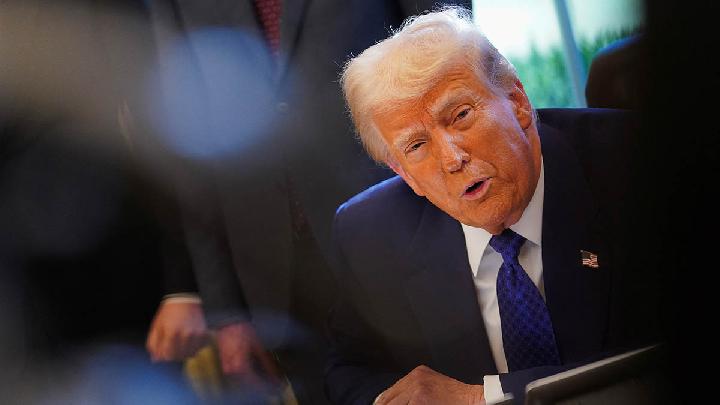
Trump wants some international students deported. These advocates wish to assist
In January, President Donald Trump issued executive orders that targeted foreigners who advocated antisemitism and hateful ideologies, particularly international students participating in pro-Palestinian demonstrations at universities.
The orders, according to activist groups like the Chicago Jewish Alliance, Mothers Against College Antisemitism, the U.S. branches of Zionist organization Betar, and the Shirion Collective surveillance network, offered what they claimed was a long-needed instrument to help curb antisemitism on college campuses.
On January 21, MACA founder Elizabeth Rand posted a link to a U.S. Immigration and Customs Enforcement tip line on Facebook, saying, “If students are here on visas and they are harassing our kids, they should definitely be deported,” on February 7.
Betar went further, claiming that it gave the Trump administration the names of foreign staff and students for deportation after being labeled an extremist organization by the Jewish advocacy group Anti-Defamation League. Speaking about the planned deportations, spokeswoman Daniel Levy said, “We are pleased this process has now begun.” Betar did not offer proof of such a list.
Requests for comment from the US Departments of Justice, State, and Homeland Security were not answered.
Trump’s first-term travel ban, which prohibited citizens of seven Muslim-majority nations from entering the country and caused mayhem at airports before a federal court declared it unconstitutional, has not yet been affected by the orders.
Arab American organizations have stated that they are ready to contest the policy in court, while civil rights attorneys have stated that the orders might infringe upon the right to free expression guaranteed by the constitution.
Some Jewish activists demonstrated a readiness to collaborate with the Trump administration on a shared cause by responding to the executive decrees. However, according to Facebook posts, some MACA members announced their departure from the organization because they felt that covering foreigners smacked of covering Jews during World War Two.
While applauding Trump’s directives, prominent Jewish American advocacy organizations like the American Jewish Committee and the ADL refrained from urging citizens to report international students to the government.
Following the October 7, 2023, Hamas attack on Israel and the Israeli invasion of Gaza, pro-Palestinian demonstrations erupted on American college campuses for months.
A spike in hate crimes and incidents against Jews, Muslims, Arabs, and other people of Middle Eastern heritage was reported by civil rights organizations. Jewish American and pro-Israel organizations published the images and personal data of American and international students and faculty members they accused of being Hamas supporters, doxing them online. Similar strategies were employed by a number of pro-Palestinian organizations to criticize Israel’s defenders.
SPEECH ON CAMPUS
The Education Department said it was looking into five colleges for suspected antisemitic harassment, while the U.S. Justice Department announced intentions to establish a task force to combat antisemitism in schools and universities since Trump entered office.
In contrast, the executive directives targeted employees and students for possible deportation. The decree issued on January 20th asked for stricter screening of international students from “security-risk” regions or countries to make sure individuals who “espouse hateful ideology” are either denied entry or have their permits revoked.
The directive issued on January 29 demanded a list of suspected civil rights abuses related to pro-Palestinian demonstrations on campuses, which might result in the expulsion of “alien students and staff.”
According to certain civil rights organizations, if the directives are implemented, they will probably be challenged in court.
American Civil Liberties Union speech and privacy expert Ben Wizner stated, “The president should not be in the business of policing speech on college campuses.”
Since Trump took office, several Palestinian students have had their visas canceled, according to the American Arab Anti-Discrimination Committee.
The civil rights organization sent an image of the revoked paperwork and screenshots of its email correspondence with the State Department about a Gaza student whose visa was revoked this month to Reuters.
According to ADC director Abed Ayoub, the Gazan student did not participate in campus protests and seemed to be singled out because of her national identity.
The ADC was one of several organizations that cautioned that Trump’s decision from January 20 set the stage for his Muslim ban to be reinstated. According to a spokeswoman, after the order was completely enforced, the group intended to sue the administration.
“It is happening, our students and our international students are being targeted,” Ayoub stated.
Many pro-Palestinian demonstrators claimed they were protesting against Israel’s invasion of Gaza, where health officials believe more than 47,000 Palestinians have been dead, and denied backing Hamas or committing antisemitic crimes.
Hamas militants assaulted Israel, murdering 1,200 people and kidnapping another 250 more, sparking the start of the war.
According to Alex Morey, vice president of college advocacy at the Foundation for Individual Rights and Expression, the government must demonstrate tangible acts, like sending money, in addition to verbal support in order to convict someone of materially aiding a foreign terrorist group.
According to protest organizers at Columbia University in New York, Americans have planned and executed the majority of pro-Palestinian and anti-Israel protests. According to them, foreign students who are there on visas frequently feel uneasy about taking any actions that could jeopardize their enrollment or result in their detention.
All Categories
Recent Posts
Tags
+13162306000
zoneyetu@yahoo.com


